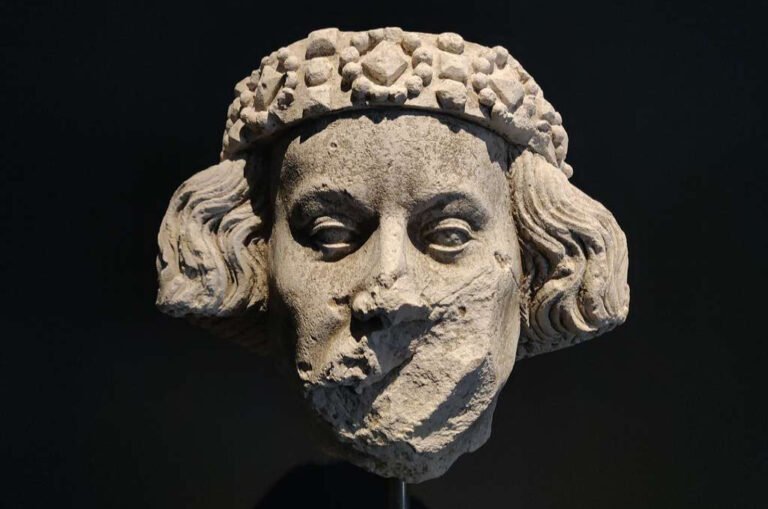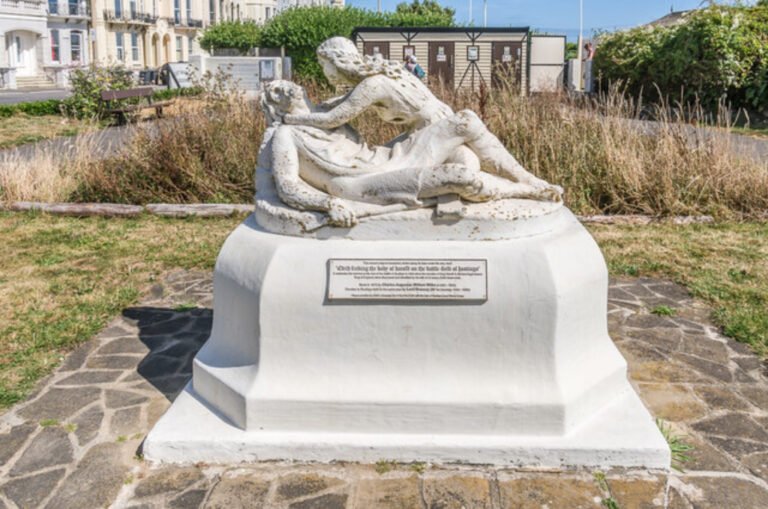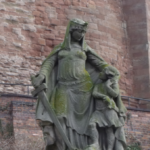Understanding the thoughts, conflicts, and beliefs of early medieval Britain can be gained through perusing ancient English poetry. “The Wanderer,” a poem that explores topics of exile, loneliness, and the interest of reason in a chaotic world, is among the most critical works of this age. Even though “The Wanderer” was composed more than a thousand years prior, it still has significance nowadays since it touches on universal human issues.
What is “The Wanderer”?
The Old English poetry “The Wanderer” was probably composed in the tenth century, though its roots may go back even farther. It is included in the Exeter Book, one of the most significant collections of Old English poetry. The Wanderer, a lone figure in the poem, mourns the passing of his lord and friends while thinking profoundly on memory, grief, and the harshness of life.
The Wanderer travels through a world characterized by suffering and impermanence on a physical and spiritual journey. The poem, which is set against the backdrop of Anglo-Saxon culture, captures the ambiguities of the time when fate, exile, and conflict were major factors in people’s lives.
The Structure of “The Wanderer”
Composed in the alliterative verse typical of Old English poetry, “The Wanderer” uses a particular structure that relies on repetition of sounds at the beginning of words instead of rhyme. This makes a rhythm that mirrors the melancholy tone of the poem. Furthermore, the poem makes use of kennings—a complex device common in Anglo-Saxon poetry—where compound expressions like “whale-road” (meaning sea) are used to evoke vivid imagery.
Themes of Exile and Loneliness
At its essence, “The Wanderer” explores the theme of exile. The hero is cut off from his community and constrained to wander alone. Within the setting of Anglo-Saxon society, where loyalty to one’s lord and kin was vital, exile was one of the worst fates one may persevere. The Wanderer’s physical isolation is reflected by his emotional confinement, as he laments for his lost comrades and the destruction of the world he once knew.
The theme of loneliness is profoundly interlaced with this exile, reflecting not only the Wanderer’s outside world but also his internal turmoil. He is haunted by memories of happier times, and his confinement becomes a metaphor for the human condition—estranged from others and longing for something that seems unreachable.
The Role of Fate (Wyrd)
The concept of fate, or wyrd, is central to “The Wanderer.” In Anglo-Saxon conviction, wyrd was an unavoidable force that formed the course of human lives. The Wanderer’s reflections often turn to how fate has robbed him of his lord and companions. He resigns himself to the understanding that suffering may be a part of life, but this resignation is tinged with distress and a recognition of the inescapable part of fate in his misfortunes.
Fate in the poem serves as both a destroyer and a teacher. Through his losses, the Wanderer gains wisdom, realizing that nothing in life is permanent, not even kings and their kingdoms.
The Search for Wisdom and Consolation
Throughout the poem, the Wanderer searches for meaning amidst his suffering. His musings are filled with a desire for wisdom—specifically, the kind that comes from enduring hardship. The poem presents a stoic philosophy, suggesting that understanding life’s transience can lead to a form of acceptance. This stoicism is intertwined with Christian elements, as the Wanderer eventually turns his thoughts towards God and the promise of eternal salvation, finding a semblance of hope in an otherwise bleak existence.
The Imagery of Ruin and Decay
One of the most striking highlights of “The Wanderer” is its vivid imagery of decay. The Wanderer envisions a demolished city, abandoned and disintegrating, a powerful metaphor for the impermanence of human achievements. This symbolism is reflective of the broader theme of transience, where even the most mighty and glorious must succumb to time and destiny.
The image of the disintegrating walls serves as a reminder that worldly things are fleeting, and what once stood strong will eventually fall.
The Sea as a Symbol
In numerous Old English poems, the sea is a strong image, and in “The Wanderer,” it represents both literal and passionate journeys. The Wanderer’s voyages over the sea reflect his inner struggle. Like fate, the sea is massive, cold, and careless. It acts as a metaphor for the Wanderer’s own feelings of lose hope and the unpredictability of life’s path. The endlessness of the sea also increases his sense of isolation, as he is adrift in a world that no longer offers him a place of belonging.
The Concept of Community and Kinship
The absence of a lord and kinship is another central theme. In Anglo-Saxon culture, loyalty to one’s ruler was a defining perspective of identity. The passing of the Wanderer’s lord leaves him without purpose, cut off from the bonds that once defined him. The poem grieves this loss of community, depicting it as both a personal and societal catastrophe. Without his ruler, the Wanderer isn’t only physically adrift but also spiritually lost.
Christian Elements in “The Wanderer”
Though steeped in the pagan conventions of the Anglo-Saxon world, “The Wanderer” also contains Christian components, a reflection of the gradual Christianization of Britain at the time. The Wanderer’s lamentations in the long run turn towards God, and he looks for consolation in the idea of divine kindness and the hope of eternal life. This mixing of Christian and pagan beliefs highlights the move from a culture centered on earthly glory to one that recognizes the significance of spiritual salvation.
The Use of Memory in the Poem
Memory plays a pivotal part in “The Wanderer.” The hero is tormented by memories of his past, and these memories are a double-edged sword. They offer him some solace, as they remind him of better times, but they too extend his despair, as they differentiate strongly with his current state of desolation. In this way, memory becomes both a source of consolation and torment, highlighting the complex relationship between the past and present.
The Role of Nature in “The Wanderer”
Nature in “The Wanderer” is often portrayed as harsh and unforgiving, much like the emotional landscape of the protagonist. The cold sea, the desolate earth, and the empty horizons reflect the Wanderer’s inner despair. The natural world mirrors his feelings of isolation and sorrow, serving as a constant reminder of his separation from human society.
Comparison with Other Old English Poems
“The Wanderer” offers numerous topical similarities with other Old English poems, especially “The Seafarer” and “Beowulf.” Like “The Seafarer,” it explores the brutality of life at sea and the passionate toll of exile. In contrast, “Beowulf” deals more with heroism and community, though it too reflects on the impermanence of human achievements. What sets “The Wanderer” apart is its strongly center on introspection and the individual’s search for meaning in a world where all things pass.
The Legacy of “The Wanderer”
“The Wanderer” has influenced countless works of literature, especially in its portrayal of existential themes. Its exploration of loneliness, fate, and the search for wisdom can be seen in later literary movements, including existentialism and Romanticism. Modern readers and scholars continue to find relevance in its timeless meditation on human suffering and resilience.
Conclusion
In conclusion, “The Wanderer” is a significant reflection on the human condition, exploring themes of exile, fate, and the seek for meaning in a temporal world. Through its evocative imagery and profound philosophical experiences, the poem resonates with readers across centuries, offering wisdom that transcends its time. Its mix of pagan and Christian components, along side its exploration of loneliness and community, ensures that “The Wanderer” remains an ageless piece of literature that continues to speak to our deepest concerns.
FAQs
What is the main theme of “The Wanderer”?
The main theme of “The Wanderer” is exile and the emotional toll of loneliness, compounded by reflections on fate and the transient nature of life.
How does “The Wanderer” reflect Anglo-Saxon values?
Along with expanding Christian influences, the poem portrays ideals like kinship, faith in fate (wyrd), and loyalty to one’s lord.
What is the significance of exile in the poem?
Exile represents the Wanderer’s physical and emotional isolation, symbolizing a loss of identity and purpose in a world where community bonds are essential.
How does Christianity function in “The Wanderer”?
Christianity offers a sense of hope and consolation in the poem, presenting a path to salvation that contrasts with the harshness of worldly life.
How is nature portrayed in the poem?
Nature is depicted as cold, harsh, and unforgiving, mirroring the Wanderer’s internal desolation and highlighting his separation from society.








